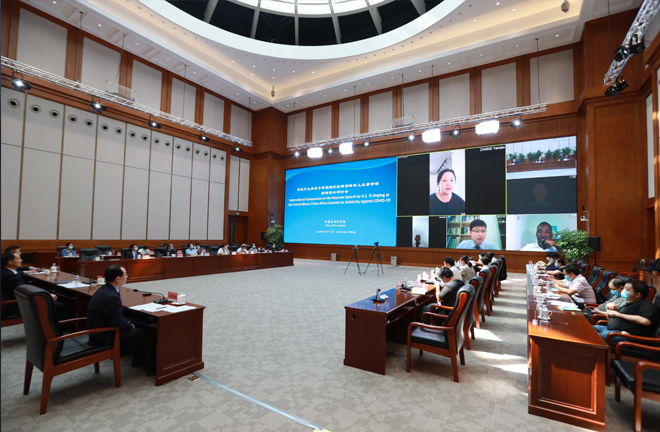Scholars call for deepened China-Africa exchange and cooperation

An international symposium on deepening China-Africa exchange and cooperation was held on June 30. Photo: ZHANG ZHE/CSSN
An international symposium was held at the end of June discussing the keynote speech delivered by President Xi Jinping at the Extraordinary China-Africa Summit on Solidarity Against COVID-19. The symposium aimed to strengthen exchanges between China-Africa scholars and provide intelligence support to the sustainable development of China-Africa relations and the joint construction of the Belt and Road.
In the opening remarks, Gao Xiang, vice president of the Chinese Academy of Social Sciences, said that facing the COVID-19 pandemic, China and Africa have united together and shown brotherhood in times of adversity, demonstrating the spirit of the community of common destiny and building an example of battling the virus collaboratively. President Xi Jinping’s speech attracted widespread attention from the international community, drawing a positive response. China and Africa have always maintained good friendship and brotherhood. In the pandemic situation, it is necessary to research China-Africa relations in the post-pandemic era and the global pattern from an academic perspective to strengthen exchanges and cooperation and raise up a voice protecting multilateralism.
Nkolo Foe, a professor at the University of Yaoundé I in Cameroon, mentioned that President Xi emphasized that unity and cooperation are the most powerful weapons to fight the pandemic. Africa highly appreciates China’s efforts to maintain the essential role of the United Nations in global governance and China’s firm support for the WHO and its director-general Tedros Adhanom Ghebreyesus. Although Africa is not the region most affected by the virus, it is necessary to improve its capacity for epidemic prevention, to strongly support the laboratories of universities and research centers, and to promote the integration of traditional Chinese medicine and traditional African medicine.
Wang Zhan, deputy dean of the School of Foreign Languages and Literature at Wuhan University, mentioned that the China-Africa community of health for all was proposed at the key moment in the face of the pandemic. It is demonstrated to be a joint action that faces dangers, defuses threats and seizes opportunities. It is also an important achievement of the “eight major initiatives” of the 2018 Beijing Summit of the Forum on China-Africa Cooperation with iconic significance and exemplary effects.
A senior specialist of the Ethiopian Ministry of Culture and Tourism believed that the Belt and Road initiative of China has brought many opportunities for Africa to improve industrial and agricultural technologies and develop infrastructure in the past few years. At the crucial moment of fighting the novel coronavirus, China has become a capable and willing partner of the African continent.
Alain A. Nyamitwe, special advisor to the executive secretary of the African Capacity Building Foundation, said in the closing ceremony that African countries are looking forward to the Belt and Road initiative as it could play a key role in developing manufacturing, which is exactly what Africa must focus on.
Wang Lincong, vice president of the China-Africa Institute, believed that scholars and think tanks in China and Africa need to innovate with their methods and mechanisms of cooperation and research new issues to inject a fresh impetus into the higher quality development of China-Africa relations and Belt and Road construction.
edited by YANG LANLAN

 PRINT
PRINT CLOSE
CLOSE